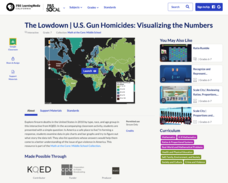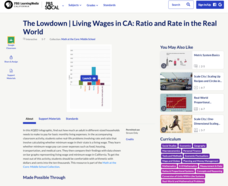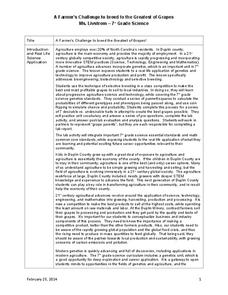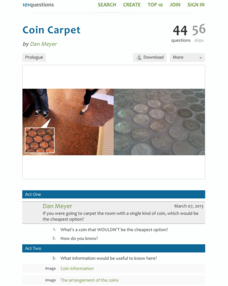Mathed Up!
Utility Bills
What is the total cost? Provided with seven problems, pupils determine the total cost for utilities. Scholars determine the amount of the utility used and determine the cost based upon the given unit rate. The resource is part of a prep...
Mathed Up!
Percentages
Review a percentage of math skills. Designed to review for the General Certificate of Secondary Education Math assessment, the resource provides practice with a variety of percent problems. Items provide pupils problems ranging from...
PBS
Atlantean Dodgeball
Which team has the advantage? An imaginary story about a game of dodgeball in the lost city of Atlantis demonstrates the ways to compare two quantities. One coach compares the ratios of the numbers of players on each team while the other...
PBS
KidVid: Scaling Up Rectangles
Tip the scale in your favor when learning about scale factors. After viewing a video clip of a learner trying to determine the scale factor of the areas of two rectangles, scholars consider how changing the dimensions of a rectangle...
PBS
Super Bear: Comparing Mass
A super bear is a whole lot of gummy bear. Scholars hone their estimation skills by completing an activity. Given the masses of a mini gummy bear and a regular gummy bear, they must determine the number of each needed to have the same...
PBS
Math with Jake: Frequencies and Pitch
Be an octave above the rest. A musician explains how to write music in different time signatures. An interesting resource continues to demonstrate ratios using the pitch of musical notes and hertz. Pupils use a pitch table and determine...
PBS
The Lowdown — U.S. Gun Homicides: Visualizing the Numbers
Is gun violence a big issue in America? Pupils explore gun deaths by type, race, and age group in a Math at the Core: Ratios interactive. The class tries to determine whether America is a safe place to live and use bar graphs and pie...
PBS
Human Tree: Ratios
Create a personal tree. By visiting an exhibit at the National Museum of Mathematics, the resource introduces the idea of fractals. The exhibit takes an image of the person and creates a tree by repeating scaled images on the shoulders...
PBS
Scale City — Proportional Relationships in the Real World
Strive to determine your stride. Scholars first view an informative video on the Kentucky Horse Park and the 28-feet stride of the Man o' War. They then work together in groups to find the length of their own strides by using the number...
PBS
The Lowdown — Living Wages in CA: Ratio and Rate in the Real World
How much money is enough money? Future wage earners explore the minimum hourly wage and then use it to calculate monthly and yearly earnings. They use an interactive to consider living costs and determine whether earning a minimum wage...
PBS
Real-World Proportional Relationships: Gender Wage Gap
When will the gender wage gap disappear? Scholars use a provided infographic to see trends in wage gap over time. They use ratios of women's wages to men's wages to determine which decades had the greatest change in the wage gap. The...
PBS
Scale City — Scaling up Recipes and Circles in the Real World
What a great big skillet you have. The resource introduces the class to the world's largest stainless steel skillet. The class creates a model of the skillet and a typical 12-inch skillet and compares the relative sizes of their areas....
Council for Economic Education
Calculating Simple Interest
How much is owed? A calculated resource introduces the simple interest formula with a video that describes how to use it. Classmates then show what they know by answering questions within a simple interest worksheet.
Concord Consortium
Hockey Pucks
Package design is a mathematical task for any business. Young scholars use a package design to determine the number of packages required for specific shipments. Using ratios, proportions, and fractions, they make decisions about the best...
Concord Consortium
Heights and Weights
Height is dependent on weight—or is it the other way around? Given data from a physicians handbook, individuals compare the height and weight of males and females at different areas. They calculate differences and ratios to assist with...
CCSS Math Activities
Cereal
Your breakfast cereal is a good source of math practice. Young mathematicians apply ratios and percents to analyze the amount of protein and carbohydrates in two brands of cereal. They complete a worksheet to answer several questions on...
PBS
Estimating Profit from a Job
Profit always seems to get everyone's attention. The same is true during a lesson on estimation. Learners use given information to estimate the cost of supplies for a painting job. They then develop a strategy for estimating the...
101 Questions
Canadian Thanksgiving Tradition
It's all about the portion size! Given a photo of a pumpkin pie, learners work to determine the number of calories that are missing. Supplemental information provides the angle of the piece that is missing as well as the nutritional...
101 Questions
Combining Coupons
Everyone likes to save money! Use your math skills to figure out just how much you can save on a pair of sweet shoes. A vendor is running a percent off sale, with a percent off coupon, and a specific dollar amount coupon—and lets you use...
Kenan Fellows
A Farmer’s Challenge to Breed to the Greatest of Grapes
What does your class know about GMOs? Are they savvy to selective breeding? Challenge young minds to engineer the greatest crop of all time using a hands-on genetics unit. Learners discover the good and bad details of selective breeding,...
101 Questions
Bed, Bath, and Beyond Coupon
More money for me! Scholars explore two different coupons for Bed Bath & Beyond, one for 20 percent off and one for $5 off an item. Using some concrete examples, they determine conditions for when each coupon would be more beneficial.
101 Questions
Coin Carpet
Here's a new meaning to the expression throwing away money...a carpet of coins! An intriguing lesson requires calculations to determine the coin that would be the cheapest option, but it's a little tricky. The cost of the coin...
101 Questions
A Penny Saved is a Penny Earned
How many pennies can you save in a lifetime? One individual knows the answer! A video presentation of a question asks scholars to determine how many pennies a bank customer has saved since he was a teenager. They know the total weight of...
101 Questions
What Micheal’s Coupon Should You Use?
Get your classes on their way to extreme couponing! Young mathematicians analyze two different coupon options for the better deal. They use different scenarios to predict and compare the outcomes.

























